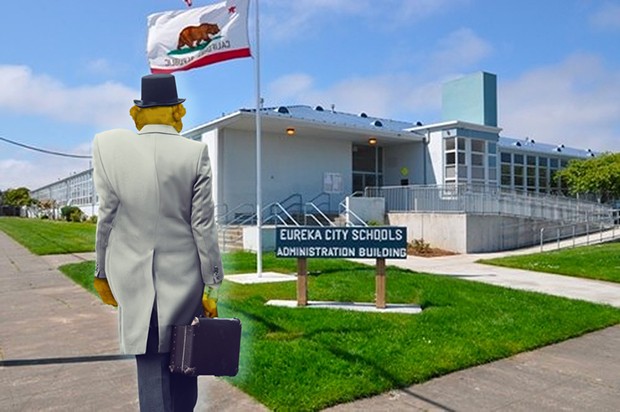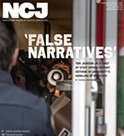Eureka City Schools and the Muppet Man
By Jennifer Fumiko Cahill [email protected] @jfumikocahill, Thadeus Greenson [email protected] @ThadeusGreenson and Kimberly Wear [email protected] @kimberly_wear[
{
"name": "Top Stories Video Pair",
"insertPoint": "7",
"component": "17087298",
"parentWrapperClass": "fdn-ads-inline-content-block",
"requiredCountToDisplay": "1"
}
]
About a week after the Eureka City Schools board blindsided the public by approving an unusual land exchange agreement to offload its old Jacobs Middle School campus in a $6 million deal, the details of which were disclosed just an hour or so before the vote, it issued a press release pledging that it is "committed to transparency and accountability in all its operations."
Yet, three months later, as questions continue to mount about the exchange and what it might mean for students, families, neighbors and the city, the board's members aren't answering questions, or even showing up to hear them asked. Instead, the elected officials who decided to approve the agreement are directing questions to the district's new superintendent, who took over the position after the deal was signed. It hardly seems like transparency or accountability.
Documents released to the Journal pursuant to a public records request indicate virtually no paper trail exists documenting how a newly minted corporation — AMG Communities-Jacobs, LLC — came to the bargaining table, or indicating the district did any due diligence to determine who is behind the corporation or whether they have the resources to make good on the deal. Current Superintendent Gary Storts, who took over for the retiring Fred Van Vleck just days after the board's Dec. 14 approval of the agreement, has told the Journal the district has only communicated with AMG's attorneys and doesn't know who its principals are, saying its "understanding is that AMG is an investment group." Asked what due diligence was conducted to ensure AMG can come up with the cash needed to close the transaction, Storts said the California Education Code doesn't require a district to vet the financials of a party to a real estate transaction.
Asked why the district chose not to require an "earnest money" down payment — which commonly run 1 percent to 5 percent of the total sales price in commercial real estate transactions, and sometimes reach 10 percent, which would range from $60,000 to $600,000 for the Jacobs agreement — Storts did not answer directly. He did, however, point out the exchange agreement required a $1,000 non-refundable payment from AMG.
It's worth pausing here to consider what the average local buyer would need to do to purchase a $200,000 home. Customarily, they'd need to first identify themselves, then present a pre-approval letter for a loan, or at least bank statements and paystubs indicating they'd be able to qualify for one. They'd likely need to provide a good-faith down payment — which would typically run $2,000 to $6,000 — at the time of signing the purchase agreement. Why is all this required? Because most sellers want to make sure a buyer can and intends to close the deal and ensure they won't simply walk away.
AMG Communities-Jacobs, LLC's principals, meanwhile, did not jump through any of these hoops and have declined requests to talk about the project or even be identified, leaving the public to wonder who these mystery buyers are and what motivated them to swoop in with an expedited offer valued at roughly $2 million more than the previous highest bid the district had in hand. The LLC's spokespeople and attorneys have repeatedly cited "attorney-client" privilege in declining to answer specific questions.
It's also worth noting that crafting this agreement — which promises a $5.35 million cash payment to the district and a small home with an accessory dwelling unit on I Street as compensation for the 8-acre Jacobs site — as a property exchange allowed the district to circumvent a legal process for divesting of public land.
When selling surplus land, a school district must first make it available to other public agencies. If a deal can't be reached, the district can then get the property appraised to determine fair market value and offer it for sale to a variety of other public entities for a set time frame. If no deal is reached in that window, only then can the district offer the property for sale to the public through a competitive bidding process.
The purpose of these laws — of making public agencies jump through all these hoops when getting rid of publicly owned land — is to protect the public interest. After all, if a private landowner wants to sell off a property on a whim, that's on them, but a vacant school site represents a significant public investment, so the law is designed to protect taxpayers.
The Eureka City Schools board chose to circumvent those laws by entering into what is nominally a property exchange, though 90 percent of its value is a cash payment.
There is certainly an argument that the property exchange agreement is in the best interests of the district's students. If it comes to fruition, it will generate $2 million more in revenue than the California Highway Patrol's $4 million purchase offer would have for a cash-strapped district and its students. No matter the consternation of neighbors' who wanted to welcome the CHP, that's a defensible decision for a school board.
What's much harder to defend, however, is the board's rush to approve this agreement with virtually no public discussion, review or input, and seemingly without its staff having done any due diligence. And what's absolutely indefensible is a board doing all of the above while touting its commitment to transparency and then hiding behind its staff when asked about it.
The bottom line is we don't know who is behind AMG Communities-Jacobs, LLC or what their plans are. We know the LLC shares the same out-of-town lawyer as a ballot initiative and lawsuits seeking to block the city of Eureka's efforts to convert downtown and Old Town parking lots into housing. But maybe that's a coincidence. Maybe it's someone looking to build low-income housing, or perhaps a righteous group of developers who will build whatever the community dreams up as the property's highest and best use. Whatever the case, the secrecy doesn't inspire confidence.
We're reminded of the slapstick shtick in Jim Henson's The Muppet Show, in which the furry creatures would stand on one another's shoulders, throw on a suit or a trench coat, and stagger and stumble around impersonating a human as Muppet Man. At the moment, that's AMG Communities-Jacobs LLC: its true identity, intent and means hidden. And that's the Eureka City School board members' fault, as the duty was theirs to protect the public interest, to make sure the district isn't getting taken for a ride by someone with ulterior motives or whose aspirations have grown beyond their means.
Eventually, this Muppet Man will likely be stripped of its disguise, either through some grand reveal or because it has listed too far this way or that, its members tumbling forth. Or perhaps it will just disappear, its pockets a mere $1,000 lighter.
Regardless, Eureka voters should not forget their school board members' utter lack of transparency when selling off a publicly owned asset.
Comments (2)
Showing 1-2 of 2
More by Jennifer Fumiko Cahill
-
What's Good
New Digs for Il Forno and Obento
- Jul 11, 2024
-
Maxxxine's Bloody Point
- Jul 11, 2024
-
Il Forno in Fortuna
- Jul 8, 2024
- More »
More by Thadeus Greenson
-
Jackson's Retreat
The contract clause that allowed Cal Poly Humboldt's embattled president to step down into a high-paid instructional position
- Jul 25, 2024
-
'Profound Concern'
Alleged victim distressed by DA's handling of hate speech, antisemitic threats case
- Jul 25, 2024
-
'Inadvertent Disclosure'
Eureka City Schools emails shed light on Jacobs property swap
- Jul 25, 2024
- More »
More by Kimberly Wear
-
Huffman Joins Colleagues in Calling for Biden to ‘Pass the Torch’
- Jul 19, 2024
-
SECOND UPDATE: Victim of Fatal Shooting Identified
- Jul 17, 2024
-
Eureka Man Killed in SoHum Crash
- Jul 1, 2024
- More »
Latest in Editorial
Readers also liked…
-
Failed Leadership
- May 2, 2024


































